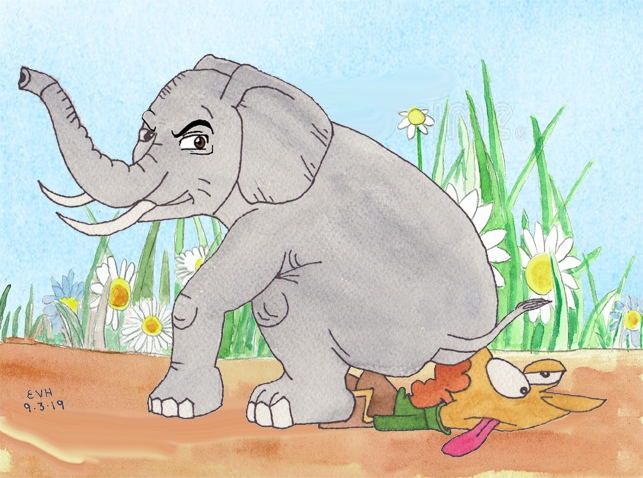
Jataka 161
Indasamānagotta Jātaka
The Story of Indasamānagotta
as told by Eric Van Horn
originally translated by William Henry Denham Rouse, Cambridge University
originally edited by Professor Edward Byles Cowell, Cambridge University
This is another curious tale in which an elephant goes rogue. It seems a little odd that someone is blamed for being kind to an animal. Also, I have to admit, I love elephants. But see what you think.
“Friendship with evil.” The Master told this story while he was at Jetavana. It is about a stubborn person. The circumstances will be told in the Vulture Birth (Jātaka 427). The Master said to this monk, “In days gone by, as now, you were trampled to death by a mad elephant because you were so stubborn and heedless of wise men’s advice.” And he told the story.
Once upon a time, while Brahmadatta was the King of Benares, the Bodhisatta was born into a brahmin family. When he came of age he left his worldly home and took to the holy life. and in time became the leader of a company of 500 recluses who all lived together in the Himalaya Mountains.
Among these recluses was a stubborn and unteachable person named “Indasamānagotta.” He had a pet elephant. When the Bodhisatta found out about this, he sent for him and asked if he really did have a young elephant? Yes, the man said, he had an elephant which had lost its mother. “Well,” the Bodhisatta said, “when elephants grow up they have been known to kill even those who care for them. You better not keep it any longer.”
“But I can't live without him, my teacher!” he replied.
“Oh, well,” the Bodhisatta said, “you'll live to regret it.”
So he continued to care for the elephant, and soon it grew to an immense size.
One day the recluses went far away to gather roots and fruits in the forest. They were gone for several days. At the first breath of the south wind the elephant went into a rage.
“Destruction to this hut!” the elephant thought. “I’ll smash the water-jar! I’ll overturn the stone bench! I'll tear up the mattress! I’ll kill the recluse, and then off I’ll go!” Then he ran into the jungle and waited, watching for their return.
The elephant’s master came first. He was loaded down with food for his pet. As soon as he saw the elephant, he ran up to him thinking all was well. The elephant rushed out from the thicket. He seized him in his trunk, threw him to the ground, and then with a blow to the head crushed the life out of him. Then he trumpeted madly and ran off into the forest.

Figure: The Price of Ignoring Wise Advice
The other recluses brought this news to the Bodhisatta. He said, “We should have nothing to do with the bad,” and then he repeated these two verses:
“Friendship with evil let the good eschew,
The good, who know what duty bids them do.
They will work mischief, be it soon or late,
Even as the elephant his master slew.”
“But if a kindred spirit you do see,
In virtue, wisdom, learning like to thee,
Choose such a one to be your own true friend.
Good friends and blessing go in company.”
In this way the Bodhisatta showed his band of recluses that it is good to be reasonable and not stubborn. Then he performed Indasamānagotta’s funeral rites. And cultivating good qualities, he was reborn at last into Brahma’s heaven.
After concluding this discourse, the Master identified the birth: “This stubborn fellow was then Indasamānagotta, and I was the teacher of the recluses.”
